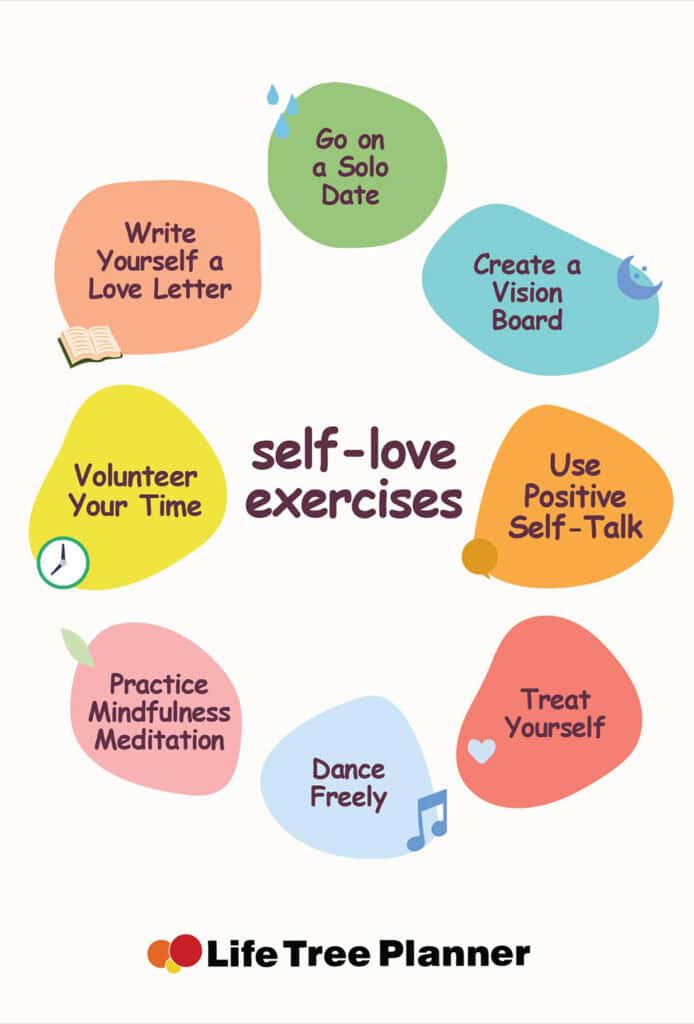


Ever wondered how you can cultivate a deeper sense of self-compassion and resilience? Welcome to the transformative world of self-love exercises.
In today’s fast-paced world, prioritizing self-care and mental health support is more important than ever. Going on a journey of self-love through intentional exercises can profoundly impact your well-being and relationships.
Together, we’ll uncover practical tools and strategies that promote self-esteem, gratitude, and a positive mindset.
Throughout this article, we’ll explore various self-love exercises designed to nurture your inner self and enhance your overall happiness.
From practicing mindfulness to indulging in acts of kindness towards yourself, these exercises are tailored to empower you on your journey towards self-acceptance.
By the end of this read, you’ll have a toolkit of self-love exercises at your disposal, each contributing to a more fulfilling and harmonious existence.
Let’s begin this journey towards embracing and celebrating the most important person in your life—you.
Here are 10 self-love exercises:

- Write Yourself a Love Letter: Take time to write a heartfelt letter to yourself, acknowledging your strengths, accomplishments, and qualities you admire.
- Practice Mindfulness Meditation: Spend a few minutes each day focusing on your breath and being present in the moment, which can reduce stress and increase self-awareness.
- Create a Vision Board: Visualize your goals and aspirations by creating a collage of images and words that inspire you, helping to manifest your dreams.
- Treat Yourself: Whether it’s a spa day, a favorite meal, or a small indulgence, treating yourself reinforces self-worth and nurtures happiness.
- Go on a Solo Date: Dedicate time to do something you love alone, like going for a walk in nature or visiting a museum, fostering independence and enjoyment of your own company.
- Dance Freely: Let go of inhibitions and dance freely to uplifting music, promoting joy and releasing pent-up emotions.
- Use Positive Self-Talk: Replace self-criticism with affirming statements that build confidence and cultivate a compassionate inner dialogue.
- Volunteer your Time: Giving back to your community or supporting a cause can boost self-esteem and provide a sense of purpose.
- Practice Acts of Kindness: Show kindness to others and yourself through small gestures like complimenting someone or practicing self-compassion.
- Take a Day Off to Recharge: Schedule a day solely for rest and relaxation, replenishing your energy and nurturing physical and mental well-being.
See also What is Perfect Love? 10 Insights into the Essence of Love
The Power of Self-Love Exercises

Unlocking the power of self-love exercises is pivotal in holistic well-being and nurturing positive relationships. By incorporating self-love activities into daily routines, individuals can elevate their self-esteem, practice self-acceptance, and align with personal values.
Utilizing tools like a self-care planner enhances self-awareness and promotes mental health support, reinforcing the importance of self-respect and confidence.
Positive psychology principles guide individuals towards positive self-talk and cultivating compassion towards oneself and others, helping inner peace and gratitude.
Reflecting on three things to be grateful for daily helps a confident outlook and fuels ideas for future success. By prioritizing self-love exercises, individuals empower themselves to live authentically and cultivate fulfilling relationships grounded in self-awareness and compassion.
Here are 8 benefits of self-love exercises:
- Improved Self-Esteem: Boosts confidence and self-worth.
- Better Mental Health: Reduces anxiety and depression.
- Enhanced Relationships: Fosters healthier connections with others.
- Increased Resilience: Helps cope with stress and setbacks.
- Positive Outlook: Promotes a more optimistic view of life.
- Self-Awareness: Encourages deeper understanding of oneself.
- Greater Life Satisfaction: Leads to overall happiness and fulfillment.
- Motivation for Personal Growth: Inspires continuous self-improvement.
Exercises for Self-Compassion

Engaging in exercises for self-compassion can profoundly enrich your self-love journey. Start by creating a self-love routine that incorporates acts of kindness toward yourself.
Write in a self-love journal, noting positive feelings, moments of joy, and expressions of gratitude in a gratitude journal.
Practice meditation to connect with your body and cultivate acceptance. Identify areas where you can nurture yourself and your relationships, helping positive feelings and confidence.
Throughout your journey, create a safe space for self-reflection, acknowledging both your strengths and areas for personal growth.
Spend every moment as an opportunity to practice love and kindness toward yourself and others. Remember, self-love is a journey, not a destination, and every step you take towards accepting and loving yourself is a step towards a healthier and happier life.
Here are 10 self-love exercises you can try:
1. Write Yourself a Love Letter
Writing yourself a love letter is a powerful self-love exercise that involves expressing all the things you appreciate about yourself. It’s an opportunity to reflect on your journey and acknowledge your worthiness.
By using positive psychology techniques such as positive affirmations, you can reinforce self-respect, personal values, and self-confidence.
This exercise brings self-awareness and encourages mental health support by promoting positive self-talk and recognizing your own needs. It’s a reminder to focus on your feelings and prioritize your own wellness.
Following gratitude and kindness toward yourself can lead to a greater sense of happiness and fulfillment. Through this exercise, you can cultivate a deeper connection with yourself and develop a stronger sense of self-love and appreciation.
Here are 10 tips on how to write a love letter to yourself:
- Start with a Greeting: Address yourself warmly.
- Acknowledge Your Worth: Recognize your value and strengths.
- Celebrate Achievements: Highlight personal milestones and successes.
- Express Gratitude: Thank yourself for your resilience and efforts.
- Offer Kind Words: Be compassionate and kind towards yourself.
- Reflect on Growth: Acknowledge how far you’ve come and the progress made.
- Set Intentions: Share your hopes and goals for the future.
- End with Love: Conclude with affirmations and self-love.
2. Practice Mindfulness Meditation
Practicing mindfulness meditation involves various techniques to cultivate awareness and presence. Incorporating shower meditation or a 10-minute sleep meditation can enhance relaxation and promote mental clarity.
Through regular meditation, individuals can create a positive mindset and reconnect with their bodies, having joy and overall health.
Utilizing meditation tools such as cushions or apps can aid in creating a conducive environment for practice. It’s a journey of self-discovery, helping to identify and accept one’s feelings and emotions. With confidence and compassion, one can navigate the ups and downs of life, improving relationships with oneself and others.
By practicing mindfulness, individuals can live more intentionally, savoring each moment with gratitude and compassion.
Through mindfulness meditation, one can cultivate a deeper relationship with oneself and develop a greater sense of compassion toward others, helping harmony and well-being in their lives.
3. Create a Vision Board

Creating a vision board is a powerful tool to visualize your dreams and goals for the future. By compiling images, quotes, and symbols that represent your aspirations, you can craft a visual roadmap toward a happy life.
Incorporating elements from your self-love checklist and affirming your self-worth, the vision board serves as a daily reminder to prioritize your well-being.
Consider including images of your ideal daily routine, inspiring quotes on gratitude and kindness, and representations of positive experiences you aspire to have.
By paying attention to your life’s direction and focusing on what makes you feel good, you can break free from the comparison trap and cultivate a sense of happiness and fulfillment.
Almost everyone can benefit from creating a vision board, as it provides a tangible way to focus on feelings of happiness and gratitude while encouraging regular exercise of positive psychology principles.
Here are 8 steps to make a vision board:
- Set Your Intentions: Define your goals and what you want to achieve.
- Gather Supplies: Collect magazines, scissors, glue, and a board or large paper.
- Find Images and Words: Cut out pictures and words that resonate with your goals.
- Arrange Your Board: Lay out your images and words on the board in a visually appealing way.
- Glue Everything Down: Secure your images and words to the board.
- Add Personal Touches: Include your own drawings, notes, or photos.
- Place It Somewhere Visible: Keep your vision board where you can see it daily.
- Reflect and Update: Regularly review and update your board as your goals evolve.
4. Treat Yourself

Treat yourself to something special by indulging in activities that nourish your soul and elevate your well-being. Start by updating your wardrobe with a new outfit that makes you feel confident and empowered, aligning with your personal values and style.
Alternatively, find yourself in a world of knowledge and growth by investing in self-love books that promote self-acceptance, self-esteem, and positive psychology.
Consider dining at a cozy restaurant that serves your favorite cuisine, savoring each bite as an act of self-care and appreciation.
Remember that self-love is a lifelong journey, so practice self-respect and self-awareness daily.
Engage in positive self-talk and affirmations, reinforcing your worth and acknowledging the beauty within. Whether you choose to spend time alone or seek mental health support, prioritize activities that align with your needs and aspirations, helping a sense of gratitude and fulfillment rooted in psychological science and realistic expectations.
See also True Love And Understanding: 15 Foundations of Deep Relationships
5. Go on a Solo Date
Taking yourself on a solo date is a powerful act of practicing self-love and tending to your own needs. Whether it’s treating yourself to a movie, exploring a museum, or enjoying a meal at a restaurant, solo outings provide opportunities for entertainment and playtime tailored to your preferences.
It’s a crucial aspect of maintaining work-life balance and nurturing your body, mind, and spirit. During these moments, you can find peace, reflect on successes, and identify areas for growth in relationships and health.
Engaging in activities you love helps you feel thankful for the little joys of everyday life and reinforces positive traits within yourself.
With each solo date, you cultivate more self-love, helping a deeper appreciation for yourself and your journey. Prioritizing healthy eating and dedicating time to self-love activities are essential components of these outings, allowing you to spend time with the most important person: yourself.
Here are 10 options for a solo date:
- Visit a Museum or Art Gallery
- Go for a Nature Walk or Hike
- Watch a Movie
- Enjoy a Coffee at a Café
- Explore a New Neighborhood
- Have a Picnic in the Park
- Attend a Live Performance or Concert
- Take a Yoga or Fitness Class
- Read a Book at a Library
- Try a New Recipe and Cook at Home
6. Dance Freely

Dance like nobody’s watching encapsulates the liberating essence of self-expression without inhibition. It’s about letting go of self-consciousness and embracing the joy of movement to our favorite music.
Whether it’s swaying to soothing deep sleep music or grooving to upbeat tunes, dance becomes a part of our Self-Care Night Checklist, promoting both physical and mental health.
Through dance, we accept and identify with our bodies, creating a positive experience that stops us from comparing ourselves to others. In social psychology, dance helps a sense of connection and belonging, enriching our lives as we spend time with ourselves.
It enhances self-worth, making us feel thankful for our bodies and the everyday life experiences we inhabit. As we dance, we recognize our positive traits, nurturing more self-love.
Paired with healthy eating and other self-love activities, dance becomes a holistic practice, promoting overall well-being and a deeper appreciation for ourselves.
7. Use Positive Self-Talk

Practicing positive self-talk is essential for cultivating self-love and promoting overall health and well-being. It involves challenging negative thoughts and beliefs that may undermine our self-worth.
By spending time identifying and accepting these negative patterns, we can create a more positive internal dialogue.
Instead of comparing ourselves to others, we can focus on our positive traits and experiences. This shift in perspective has a greater sense of self-worth and gratitude in everyday life.
Moreover, positive self-talk can lead to more self-love, encouraging us to engage in healthy behaviors like nutritious eating and self-love activities.
Through the lens of social psychology, we understand the profound impact of our inner dialogue on our emotions and actions. By prioritizing positive self-talk, we invest in our mental and emotional well-being, leading to a more fulfilling life.
Here are 10 examples of positive self-talk:
- Affirmations: “I am capable of handling whatever comes my way.”
- Encouragement: “I’ve done this before, and I can do it again.”
- Gratitude: “I am thankful for the opportunities I have.”
- Self-compassion: “It’s okay to make mistakes; they help me grow.”
- Optimism: “I believe in my ability to create positive change.”
- Strength: “I am resilient and can overcome challenges.”
- Acceptance: “I embrace who I am, flaws and all.”
- Courage: “I am brave enough to take risks and try new things.”
- Focus: “I will stay present and focused on my goals.”
- Kindness: “I treat myself with kindness and respect.”
8. Volunteer Your Time

Volunteering your time to help others is not just a charity and act of service; it’s a powerful sign of personal growth and self-love. By dedicating yourself to the needs of others, you start a journey of self-discovery and acceptance.
Engaging in acts of service allows you to step outside of yourself and gain perspective on your own needs and desires.
It’s a reminder that life is about more than just our own individual experiences; it’s about connection and community. Through volunteering, you can practice self-love by nurturing your compassionate nature and positive affirmations about your ability to make a difference in the world.
Spending time in service to others also teaches valuable life skills, such as empathy and resilience, that contribute to a fulfilling and meaningful life.
Moreover, volunteering helps you stop comparing your life to others’ and appreciate the unique path you’re on.
9. Practice Random Acts of Kindness
Practice random acts of kindness as part of your life planning and self-love journey. Follow self-acceptance through positive affirmations and prioritizing your own needs.
Engage in self-love activities that nourish your soul and spend time on what brings you joy.
Stop comparing yourself to others and focus on your own path to success. In relationships, accept both yourself and others, helping a sense of connection and understanding.
Tune into your feelings and honor your body’s needs, letting go of comparisons and responsibilities that weigh you down. By practicing kindness, you cultivate a more compassionate and fulfilling life.
Here are 10 examples of random acts of kindness:
- Complimenting Someone: Offer genuine praise or appreciation to brighten someone’s day.
- Paying for Someone’s Coffee: Surprise a stranger by covering their coffee or meal at a café.
- Writing a Thank-You Note: Express gratitude to someone who has made a positive impact on your life.
- Giving a Hug: Offer a comforting hug to a friend or family member who may need it.
- Donating to Charity: Contribute to a cause you care about, whether financially or through volunteer work.
- Helping a Neighbor: Assist a neighbor with tasks like grocery shopping or yard work.
- Listening Actively: Take time to listen attentively to someone who needs to talk or share their feelings.
- Sending a Positive Message: Send an encouraging message or note to someone who might be going through a tough time.
- Volunteering: Dedicate your time to a local organization or community initiative.
- Offering Support: Offer practical help or emotional support to someone facing a difficult situation.
10. Take a Day Off to Rest and Recharge
Take a day off to practice self-love and engage in rejuvenating activities. Spend time in nature, perhaps with a calming walk in the park or a refreshing hike. Visit the gym for some invigorating exercise to nourish your body and boost your mood.
Use this time for family bonding, strengthening relationships, and cherishing moments together. Embrace the feeling of acceptance for yourself and your loved ones. Reflect on life, success, career, and wealth, appreciating your achievements and setting new goals. Allow yourself to unwind and recharge, ensuring a balance between work and relaxation for overall well-being and happiness.
See also Body Language of Love: Decoding the Silent Signals of Affection
Self-Love Exercises: A Recap
In cultivating self-love, practicing self-acceptance is paramount. Begin by creating a love checklist, a personalized guide to nurturing your well-being and happiness. Dedicate time each day to practice self-love, such as affirmations, gratitude journaling, and acts of kindness toward yourself.
Start self-acceptance as an ongoing journey, acknowledging your worthiness and inner beauty.
Recognize that self-love is foundational to healthy relationships, both with yourself and others. As you deepen your relationship with yourself, you’ll notice a positive shift in your feelings toward others and the world around you.
Moreover, self-love contributes to personal growth challenges, resilience, and adaptability in the face of career and wealth pursuits.
Remember, practicing self-love is not selfish; it’s essential for your overall well-being and fulfillment. By prioritizing self-love and self-acceptance, you embark on a transformative journey towards a more joyful and meaningful life.


